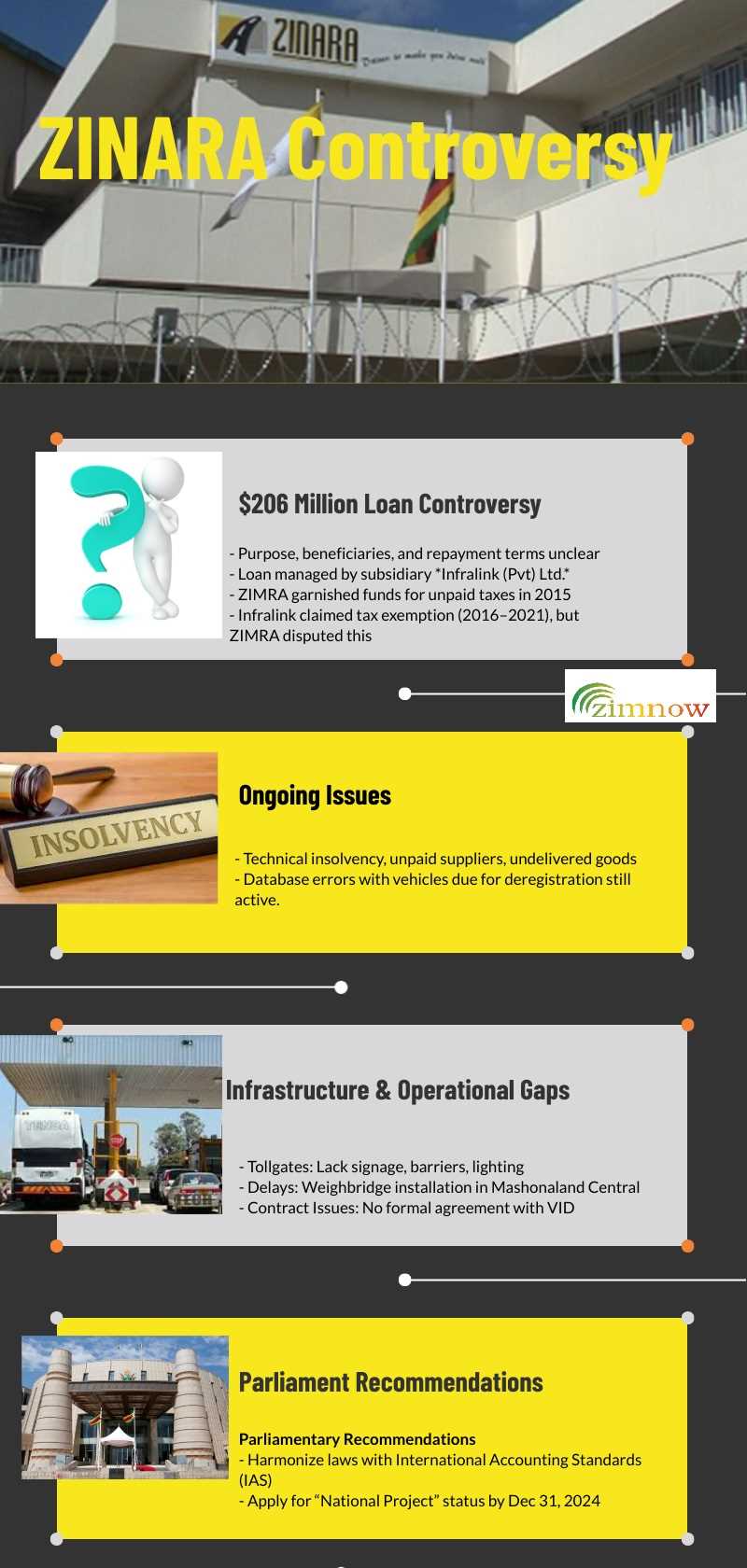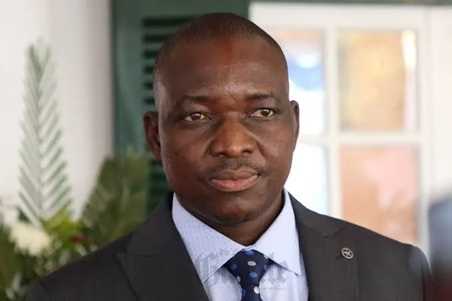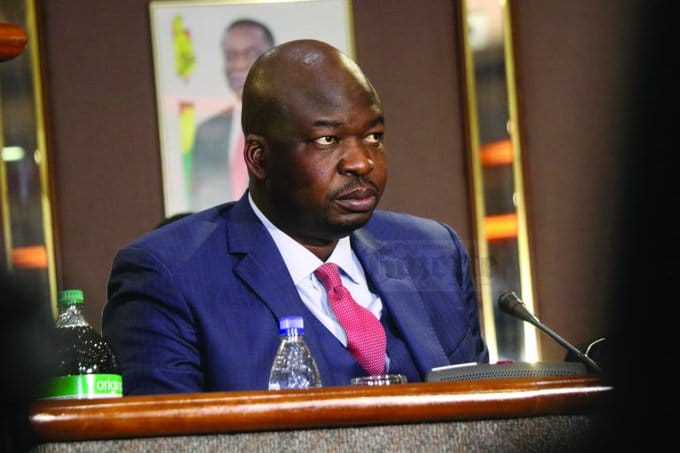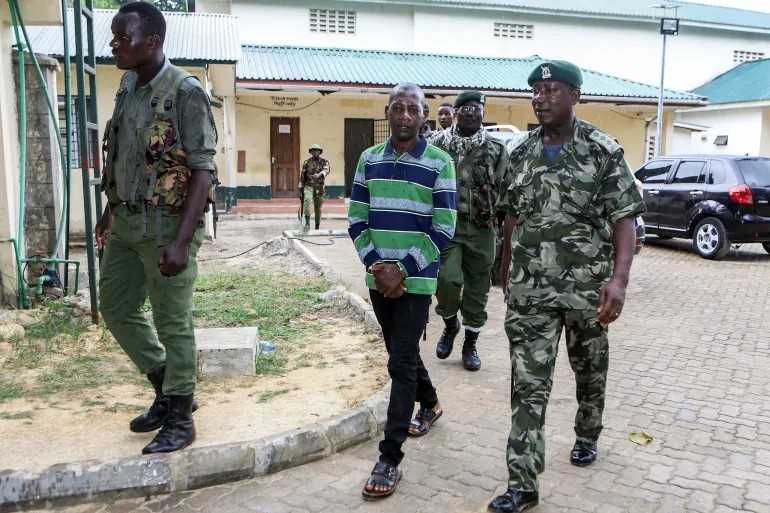
Nyashadzashe Ndoro
Chief Reporter
A damning report has exposed significant irregularities within the Zimbabwe National Road Administration, sparking widespread concerns over transparency and accountability.
At the center of the controversy is a US$206 million loan extended to ZINARA for constructing the Plumtree-Harare-Mutare Highway, facilitated by the Reserve Bank of Zimbabwe.
This deal has been clouded by questions about its purpose, beneficiaries, and repayment terms.
The report, released by the Parliament of Zimbabwe's Public Accounts Committee, analyzed ZINARA’s audited financial statements for 2021 and 2022, revealing multiple issues that demand immediate attention.
According to the committee's findings, ZINARA’s subsidiary, Infralink (Private) Limited, was incorporated to manage the loan. However, the company’s tax status has been disputed, with the Zimbabwe Revenue Authority garnishing Infralink in 2015 for understated income tax and Value Added Tax liabilities.
The Auditor General's Report disclosed that Infralink did not accrue taxes for the 2016 to 2021 financial years, claiming exemption from paying taxes. ZIMRA, however, disputed this, asserting that the company is a taxable entity.
ZINARA officials informed the committee that they had engaged the Ministry of Transport and Infrastructural Development to have Infralink exempted from paying income tax and VAT, as the toll fees collected at tollgates were being collected on ZINARA’s behalf.
The committee expressed concern over the lack of transparency around the loan and recommended that the government harmonize legal instruments with International Accounting Standards (IAS). Additionally, it called for ZINARA and Infralink to seek national project status approval and apply for tax exemption by December 31, 2024.
"The government, when coming up with legal instruments, should harmonize them with International Accounting Standards (IAS)," the committee recommended.
"ZINARA and Infralink must seek national project status approval and apply for tax exemption by December 31, 2024."
The report also highlighted issues of technical insolvency, poor contract management, and the need for improved coordination among ZINARA, the Ministry of Transport, and the Vehicle Inspection Department.
Other findings included inadequate infrastructure at several tollgates, such as lack of signage, barriers, and lighting.
Related Stories
The committee also raised concerns over the delayed construction of a weighbridge at the Vehicle Inspection Department in Mashonaland Central Province.
The report revealed that ZINARA had no contract governing its principal-agent relationship with VID, which collects transit and overload fees on ZINARA’s behalf.
Further findings included poor contract management, unpaid suppliers, and undelivered goods. Additionally, ZINARA’s database included vehicles due for deregistration, contrary to the Vehicle Registration and Licensing Act.
The report, however, acknowledged ZINARA’s progress in implementing previous recommendations but emphasized the need for urgent action to address outstanding issues.
Analysts who spoke to this publication expressed concerns over ZINARA’s US$206 million deal with RBZ, highlighting issues of transparency, accountability, and fiscal responsibility.
Chenayi Mutambasere, a United Kingdom-based Zimbabwean writer, development economist, and technology architect, questioned ZINARA’s integrity due to tax disputes, technical insolvency, poor contract management, and inadequate infrastructure. She suggested that these internal issues reflect deeper systemic challenges, such as fragmented infrastructure management and weak governance frameworks.
"Disputes over its tax obligations only add layers to the opacity surrounding ZINARA’s operations. This company benefits from government subsidies without taxpayers reaping the benefits. For example, the state of roads suggests that this enterprise does not pass the subsidy on to the taxpayer," Mutambasere told Zim Now.
She added that harmonizing accounting practices with international standards could reduce mismanagement and enhance oversight of such high-stakes projects. However, she noted, granting Infralink national project status might clarify its tax status but would not address the broader integrity issues within ZINARA.
"The report’s mention of technical insolvency, poor contract management, and a lack of coordination with the Ministry of Transport and VID point to a fragmented approach to infrastructure management. Without a robust governance framework, ZINARA risks further financial irregularities that erode public confidence in its ability to manage road infrastructure funding effectively."
Mutambasere also pointed out operational inefficiencies, citing the lack of basic infrastructure at tollgates, such as signage, barriers, and lighting, as indicators of ZINARA’s inadequate performance. She emphasized the need for a formal contract with VID, which collects essential transit fees, to close accountability and oversight gaps.
Pride Mkono, a social justice activist, characterized the deal as a "loan scam" filled with "sweetheart deals" for contractors who evade taxes and fail to deliver services.
He criticized tenderpreneurs who avoid taxes while citizens face heavy taxation, urging Parliament to investigate the irregularities and hold those involved accountable.
"This US$206 million loan scam is consistent with what we have seen with boards like ZINARA, where tenders are awarded preferentially through sweetheart deals," said Mkono.
"Many contractors fail to deliver on their mandates, evade taxes, and simply use public funds without providing the services they are paid for. Afterward, they evade paying taxes, which is deeply troubling given the levels of corruption and mismanagement in public enterprises.
"It’s critical that everyone pays taxes because they sustain government operations. Taxing citizens while allowing tenderpreneurs to go untaxed is unacceptable. Parliament must investigate and ensure everyone involved is held accountable."




















Leave Comments